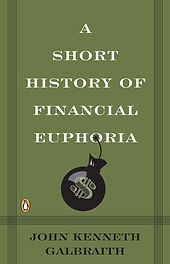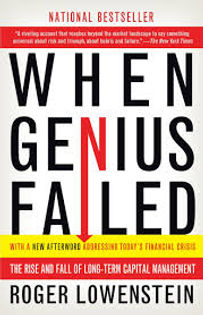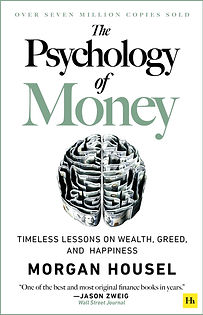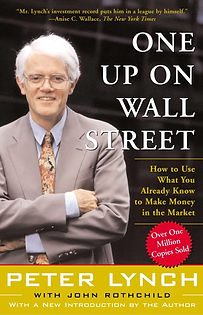Reading
I'm an avid reader of both investing and non-investing books and want to share my reading with those who would be interested. My ratings naturally skew higher than a 5/10 because I usually set books down that I don't enjoy.






















Psychology of Intelligence Analysis: 9/10
Great book on becoming a better analyst. The author, Richards Heuer, worked for the CIA and speaks on how we can set up systems and processes that remove bias and allow us to conduct better analysis. His theory of Analysis of Competing Hypothesis states that we should think as scientists when approaching nuanced problems with various outcomes. Instead of developing a single hypothesis and finding evidence to support said hypothesis, we should raise many different hypothesis and use the evidence to narrow them down to a pool of likely outcomes.
A Short History of Financial Euphoria: 6/10
Short read on various financial disasters that have occurred over the last few hundred years. My favorite learning from the book was Gailbrath's theory that there are two groups of people that create financial bubbles. The first group are those who truly believe the "new thing" will change the world and thus merits a ridiculous valuation. The second group are folks who get caught up in the speculation, are aware that it's speculation, and feel that they can get out before the bubble pops.
Investing with Anthony Bolton: 8/10
The book itself isn't anything special but I feel that I've never read a an investment philosophy that I agree with so wholeheartedly. Bolton ran Fidelity's UK Special Situations fund for 29 years and beat his most comparable index by 4% per annum. He did it by investing in a variety of special situations and was touted by his peers as an "independent thinker". You can tell his love for investing was crucial to his performance.
Blink: 7/10 and Tipping Point: 6/10
I read Blink and Tipping Point from Malcom Gladwell back-to-back because I feel they're complementary with each other. The thesis of Blink is that after a great deal of repetition our brains are able to recognize patterns subconsciously well before we can recognize them consciously. Very applicable in investing, especially in sentiment analysis. I feel that I've already developed an ability to guess whether or not my stock will disappoint at earnings based off their setup leading into the print. Tipping Point is about how social epidemics catch fire. This is earlier Gladwell and thus has some holes which he has since pointed out.
Fooled by Randomness: 7/10
A lot of the references in this book went right over my head and I think it was longer than it needed to be, but still an enjoyable read. The two biggest takeaways I had from the book were randomness and chance influence our outcomes much more than we perceive. Often success or lack thereof is attributed to skill and certainty when there's much more at play. Taleb is a trader and so many of the analogies in the book use markets, making it all the more informative for investors and market participants. The second takeaway I had was that hindsight bias is very real and clouds are ability to accurately judge past events. A certain outcome occurring can lead to people saying "how'd I not see this coming" when in reality many outcomes were probable before the outcome unfolded.
Misbehaving: 7/10
Misbehaving is Richard Thaler's retelling of the rise of behavioral economics and some of the various theories and findings he championed in the field. I really loved the discussion of the endowment effect and loss aversion, and feel that I've been able to recognize these fallacies in my investing. The endowment effect is the idea that we value what is already in our possession more than similar alternatives that are not in our possession. An example strikes me as my Denny's holdings, which I probably wouldn't buy today if I redid my analysis yet still hold because I already have them in my possession. Loss aversion is the idea that we avoid losses more than we seek wins, as losses are more psychologically damaging than wins.
Getting Naked: 8/10
My dad, who works in client acquisition for a commercial construction firm here in Utah, recommended I read this book. It's very short and an easy read. The crux of the book is that those who are able to be vulnerable in business settings or with clients have much better outcomes than those who pretend they know everything. People don't like working with folks who have large egos and would much prefer teammates with humility.
Liar's Poker: 7/10
Liar's Poker is Michael Lewis' retelling of his days at Salomon Brothers and the general culture of Wall Street in the 1980s. It's an interesting read if you want to understand what old Wall Street used to look like. Reading this book made me feel that markets have become much more efficient since the days of Salomon Brothers and the brash bond traders they employed.
When Genius Failed: 9/10
This might be my favorite storytelling of a Wall Street event that I've read. It recounts the rise and fall of Long Term Capital Management, a hedge fund which took on astounding amounts of leverage and nearly cratered the financial system when it imploded in 1998. The failure of LTCM can teach us two things. The first is that high IQ doesn't necessarily equate to winning in markets. The smartest people in finance were working at LTCM when it blew up, and it was a lack of humility, not brains, which led to their downfall. The second lesson learned is that markets are inherently filled with black swan events that can never be properly modeled. LTCM relied on models which claimed certain events would never happen if markets are filled with rational participants. What a blunder. Markets are never filled with fully rational participants.
Investing the Templeton Way: 9/10
Might be my favorite book on investment style that I've read to date. Templeton took a deeply rational and academic approach to investing which allowed him to skate to the puck long before the rest of the market. His contrarian disposition and ability to think outside the box paired with his conviction to put capital behind bizarre ideas at times is exactly how I want to invest. I especially love the international approach he took. Go where there is value on a bottom-up basis and you'll find yourself winners.
The Spectator Bird: 9/10
Not at all an investing book but I figured I'd share it anyway because I believe in reading widely. Spectator Bird is the story of a man who is reflecting on his life, and particularly a trip to Denmark he and his wife took 20 years earlier, as he's nearing the end of it. Wallace Stegner is one of my favorite authors. He pairs very realistic storytelling with incredible insight into his characters.
Psychology of Money: 7/10
A gem of a book about the effects that money can have on people and how to correctly form a relationship with it. My favorite takeaway was that money is only important insomuch as it gives you control over your time. I strive to be in a position one day where I have the financial means to truly do what I want with my time, a more precious and limited resource. I think this should be a must read for anyone, as it pertains just as much to personal finances as it does to professional finances.
Best Practices for Equity Research Analysts: 8/10
Very applicable to the work I do on a daily basis and helped me prepare to recruit for sell-side equity research. If you're at all interested in working on the sell-side I would highly recommend reading this as it gives you a baseline understanding of the job along with the practices and traits that separate good and bad analysts.
One up on Wall Street: 7/10 and Beating the Street: 7/10
Peter Lynch is obviously one of the best investors to ever play the markets. It's interesting to hear him tell stories about La Quinta and The Body Shop in One Up and more about his career in Beating the Street. I think his general growth investing philosophy is interesting and his execution was obviously flawless. Unfortunately, I think markets have become more efficient since Peter was running Magellan and so some of the advice and insight isn't directly applicable.
Competition Demystified: 8/10
A great book on competitive advantages in business and how they can be spotted. I especially love the "everything is a toaster" insight given by Greenwald. He argues that while a product or business may have a competitive advantage now, eventually these competitive advantages will erode. The toaster was once a novel item, and the innovators behind the toaster were likely thought to have a superior competitive advantage in the field. However, other players enter and eventually these competitive advantages are torn down. Every product runs this lifecycle and it's important to know where the companies you're looking at exist along the toaster continuum.
The Most Important Thing: 9/10
Howard Marks is one of my favorite thinkers in the market. I think his thoughts on risk and cycles are particularly interesting and we should all be aware of how he defines the two. An asset is risky not because it's volatile, but because it is trading well above its intrinsic value. Beware of those peddling narratives that say "X asset can't be risky because it's always up and to the right". Marks also claims that everything moves in cycles, and you'd be a fool to think that "this time is different".
Expectations Investing: 7/10
I read this back in the fall of 2024 when I was relatively new to finance and thus lacked a lot of the prerequisite technical knowledge. However, Mauboussin's insights on the stock price being an underutilized piece of information certainly rings true. While I don't think his adherence to the efficient market hypothesis is very correct, I do think you can tell a lot about a stock based off the valuation the market currently gives it.
The Intelligent Investor: 6/10
This book is both outdated and a little long for my liking. It's an important read given the effect that Ben Graham has had on the field of investing, but I don't think it's a good read for those trying to get into markets. I would recommend someone read Buffett or Monhish Pabrai before this because they originate from Graham's school of thought and are an easier read.
The Outsiders: 7/10
A very interesting exploration into what makes a good CEO. The book follows a group of CEOs who well outperform the market and their respective peer groups. They all share an iconoclasm that is also present in the best investors. I think a trait of the best investors and capital allocators is that they think independently of everyone else and reap outsized returns because of it.
The Fountainhead: 9/10
This was my favorite book that I read over the Summer of 2025. It's an incredible novel about a man named Howard Roark who is deeply passionate about architecture. It's a message of individualism and work ethic and dedication to a craft. Howard ends up prevailing because he's simply only concerned with the work and its contributions to the world around him. This easily ranks inside my top 5 best books read of all time.
Brave New World: 7/10
This book is both outdated and a little long for my liking. It's an important read given the effect that Ben Graham has had on the field of investing, but I don't think it's a good read for those trying to get into markets. I would recommend someone read Buffett or Monhish Pabrai before this because they originate from Graham's school of thought and are an easier read.